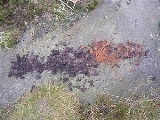
Soil horizon
Overview
Soil
Soil is a natural body consisting of layers of mineral constituents of variable thicknesses, which differ from the parent materials in their morphological, physical, chemical, and mineralogical characteristics...
surface and possesses physical characteristics which differ from the layers above and beneath. Horizon formation (horizonation) is a function of a range of geological, chemical, and biological processes and occurs over long time periods. Soils vary in the degree to which horizons are expressed. Relatively new deposits of soil parent material
Parent material
In soil science, parent material is the underlying geological material in which soil horizons form...
, such as alluvium
Alluvium
Alluvium is loose, unconsolidated soil or sediments, eroded, deposited, and reshaped by water in some form in a non-marine setting. Alluvium is typically made up of a variety of materials, including fine particles of silt and clay and larger particles of sand and gravel...
, sand dunes, or volcanic ash
Volcanic ash
Volcanic ash consists of small tephra, which are bits of pulverized rock and glass created by volcanic eruptions, less than in diameter. There are three mechanisms of volcanic ash formation: gas release under decompression causing magmatic eruptions; thermal contraction from chilling on contact...
, may have no horizon formation, or only the distinct layers of deposition.
Unanswered Questions
Discussions

